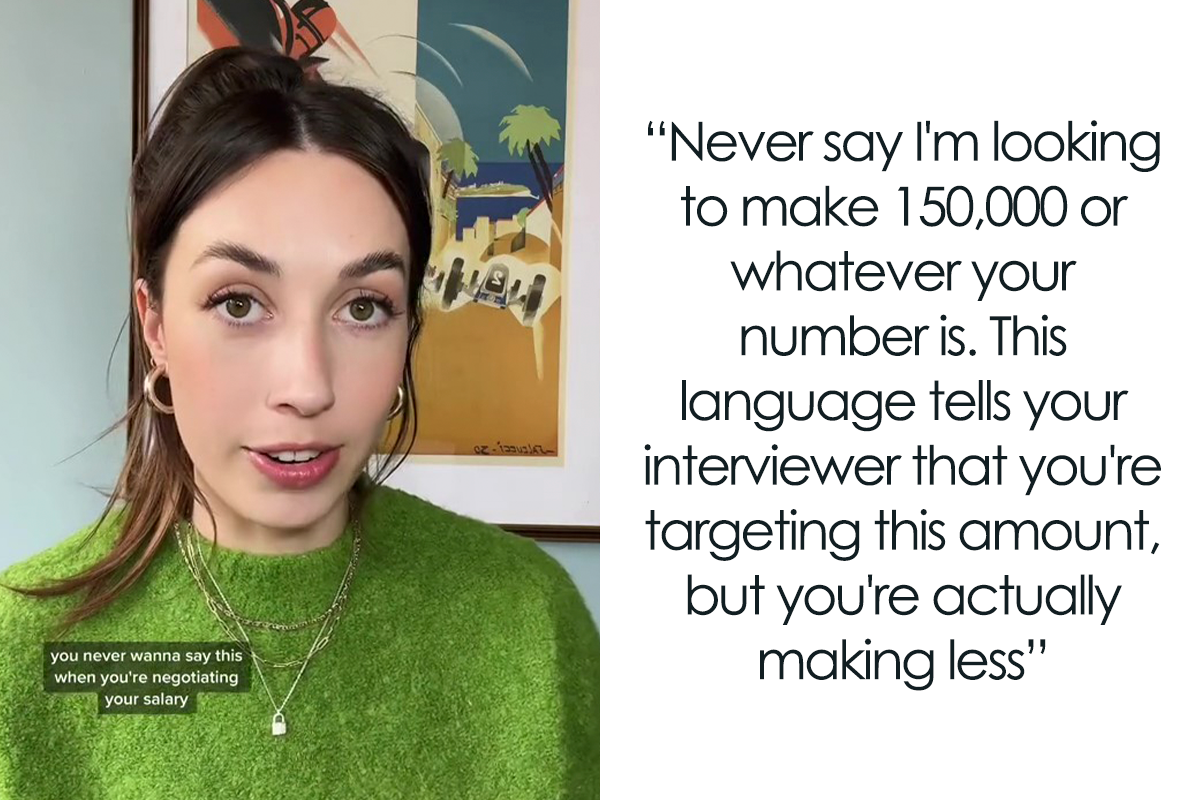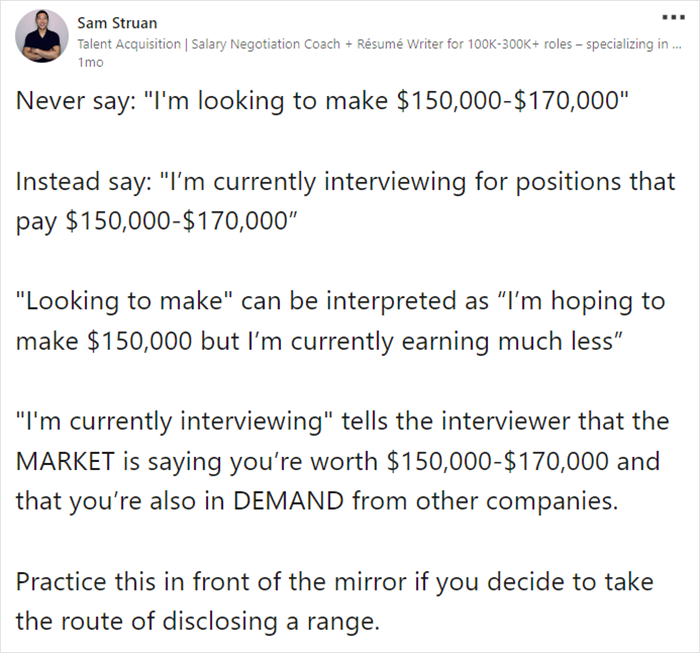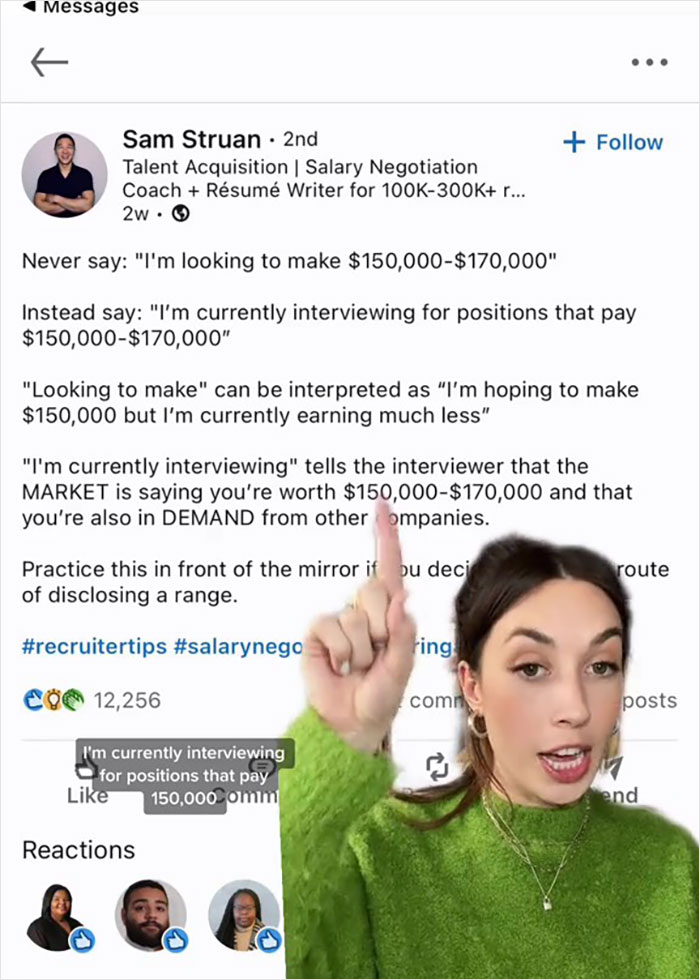
LinkedIn Post Goes Viral For Pointing Out That How You Phrase Your Salary Expectations Gives A Different Impression To The Recruiter
Negotiating salaries is hard and awkward and most people hate it as it’s a necessary evil. Unless you like volunteer work.
But, luckily for everyone, it doesn’t have to be a should I rip the band aid off quickly, or take my time and peel it? sort of situation. Maybe more of a let’s soak it in water and then take it off with more ease.
There’s a neat language tactic people can use to assert a grounded stance on where they think their salary should be, providing more legitimacy to their request and making it a tad bit harder for employers to low-ball them.
More Info: TikTok
Negotiating salaries ain’t easy, but choosing particular language might go a long way and may just help you crack the code to salary negotiations
Image credits: Sora Shimazaki (not the actual image)
Talent acquisition and career coach Sam Struan came out with a post on LinkedIn discussing a salary negotiation tactic that’s based on the intricacies of language.
Specifically, he suggests avoiding saying “I’m looking to make $150,000–$170,000” and instead opting for “I’m currently interviewing for positions that pay $150,000–$170,000.”
The argument here lies in looking to make expressing a hope, and not necessarily a realistic market value for their particular set of skills. In contrast, currently interviewing for means that the jobs the person is interviewing for are actually offering that, with an added bonus of showing that the professional is in demand.
Now, some people might argue that this particular sum may or may not be a true reflection of the market, i.e. folks may lie. Also, this does not guarantee that the company will be swayed to take people on in the end as competition can be fierce and there might be someone willing to work the same job for less. Or the company just straight up doesn’t have that kind of budget for it.
However, any recruiter who has done their research will know for a fact what the market is like, so it makes it hard for prospective employees to slide in with ridiculously high salary expectations. And sometimes—sometimes—companies might consider the higher price tag for someone who can pull their weight, so it’s always worth a try.
Ultimately, words have weight, and besides the literal and not-so-literal meaning of looking to make vs. currently interviewing for, there’s also the fact of showing ownership and confidence through what you say and how you say it in a job interview.
A LinkedIn post has recently been making rounds on the internet, suggesting “I’m currently interviewing for” instead of “I’m looking to make” language
Image credits: Sam Struan
The original post garnered nearly 12,500 reactions and hundreds of comments from other professionals. Some argued about stating ranges as it invites the employer to simply pick the minimum within the range and call it a day, though Sam explained that giving a range increases the employee’s chances if they really-really need a job.
Others had follow-up questions, mostly on the rhetoric for dealing with disclosing previous job salaries, honoring non-disclosure agreements, and the like. Sam responded to many of the comments, and it generated further discussion on the topic which you can find all in detail here.
The post was soon picked up by TikToker Hanna (of @hannagetshired fame) and shared with the wider TikTok audience. The video got 1.7 million views with over 235,000 likes. Besides rehashing everything that Sam said, she also added in the comments:
“The idea here is that it’s less about the word choice itself, and more about the subconscious perception your word choice gives the recruiter. Wording that implies you are making less than $X anchors your number below your target amount, whereas the 2nd wording anchors your number to that specific amount. The anchoring point is a very important part of negotiation because it can significantly influence the decision-making process.”
Doesn’t matter where you see this, most folks on both social venues found this piece of advice helpful, and if you did too, let us know the comment section below! Alternatively, you can share your other salary negotiation tricks, or share tactics on how to make salary negotiations less awkward.
The LinkedIn post by career coach Sam Struan was further popularized when TikToker Hanna picked it up for discussion
Image credits: @hannagetshired
Bored Panda reached out to career coach Rob Moore to elaborate on this negotiation tactic and where to go from there.
“I always think that negotiation starts at the initial point of application: as a candidate, you should give yourself permission to talk salary at this stage to avoid wasting both your and their time,” elaborated Moore. “Offering up your current salary and reward package is key and then saying that you are looking for a salary and reward in ‘banding’ above that to move, this will find common ground. You are then happy to interview knowing that both your and their expectations are aligned up front.”
A number of commenters both on LinkedIn and TikTok were wondering whether this tactic actually works with migrating roles within a company. Moore points out that people would have to opt for a similar (-ish) tactic: before approaching the boss-man, prepare your business case, i.e. provide evidence of your performance that would justify a pay raise, share the benchmark you have on salary and reward internally and externally, and explain what future value you will add to the company with this promotion.
“If the tactic isn’t working, then find out the root cause—do they not believe you are worth it? Do they really have the budget? Are they using you to get ideas from before they say no? Be curious and suspicious in equal measures to find out if you are genuinely interested in working there… Money doesn’t always mean a great job in a great business culture,” added Moore.
Rob Moore is an experienced coach, workshop facilitator, trainer and business advisor with over 25 years of experience in public and private sector coaching, recruitment and entrepreneurial business ownership under his belt. Be sure to check out his free Career Seekers Guide, as well as his website, and connect with him on LinkedIn, Facebook, Twitter, Instagram, or YouTube to learn more on how to be awesome at careering.

























25
2